#Conservation status
Explore tagged Tumblr posts
Text
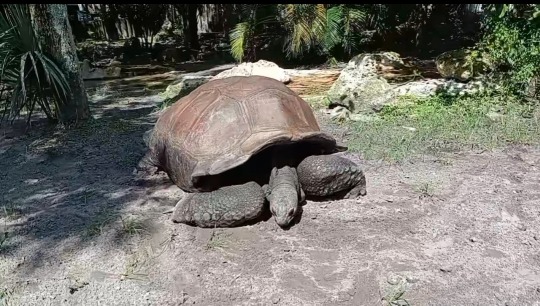
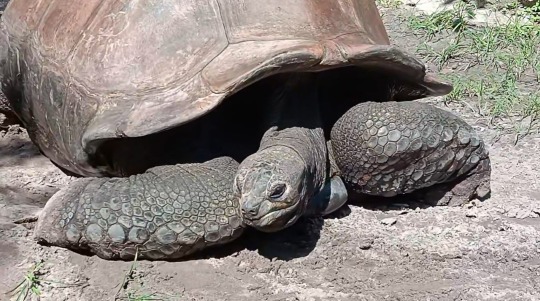
Big Jim is probably one of the oldest animals in the park. The Aldabra Tortoise can live far past 100 years, even past 200!
#not roller coasters#Big Jim the Aldabra Tortoise#Aldabra Tortoise#tortoise#giant tortoise#reptiles#2024#August 2024#zoo#zoo animals#wild animals#animals#animal#zoology#busch gardens animals#animal ambassador#animal conservation#conservation#Conservation status#Conservation status: vulnerable#vulnerable species#vulnerable#threatened species#threatened#endangered species#endangered#critically endangered#critically endangered species#busch gardens#busch gardens tampa bay
5 notes
·
View notes
Link
1 note
·
View note
Text
Preserving Saskatoon's Urban Forest

View On WordPress
#action#April 26#April 29#biodiversity#Blairmore Sector Plan Report#Blogger#Canada#City Nature Challenge#City Nature Challenge Saskatoon CNC YXE 2024#climate change#communities#conservation#Conservation Status#directions#donation#Earth#ecosystems#enhance#Facebook Group Page#forest#forests#Friends of the Saskatoon Afforestation Areas#George Genereux Urban REgional Park#Goldenrod Gall Fly#Google Maps#Green Our Cities#Human Activity#imperiled#interconnectedness#International Peace
0 notes
Text
"This beautiful antbird is one of the most spectacular ornithological finds in recent years. It was discovered in 2016, and named for the remote mountain range in northern Peru where it is found. The male has black underparts and wings, chestnut upperparts, white eyebrows, and buffy wingbars. The female has chestnut underparts and a white throat, giving her a masked appearance. Inhabits cloud forest understory, where it is usually seen walking slowly on the ground."
-eBird


[2695/11080] Cordillera azul antbird - Myrmoderus eowilsoni
Order: Passeriformes Suborder: Tyranni Family: Thamnophilidae (antbirds)
Photo credit: Andrew Spencer via Macaulay Library
50 notes
·
View notes
Text
Marian gardens are so beautiful 🌹🤍




#conservative#homemaker#tradgirl#tradition#catholic#christian#marian garden#mother mary#tradwife#50s#mother#wife#garden#garden inspiration#flowers#botany#statue#saint joseph#baby jesus#jesus christ#jesus#devotional
458 notes
·
View notes
Text
"Zeugma Mars" Statue from Turkey, c.250 CE: this statue depicting Mars, the Roman god of war, was unearthed from the ruins of a city that was occupied and plundered by the Sassanids in 253 CE
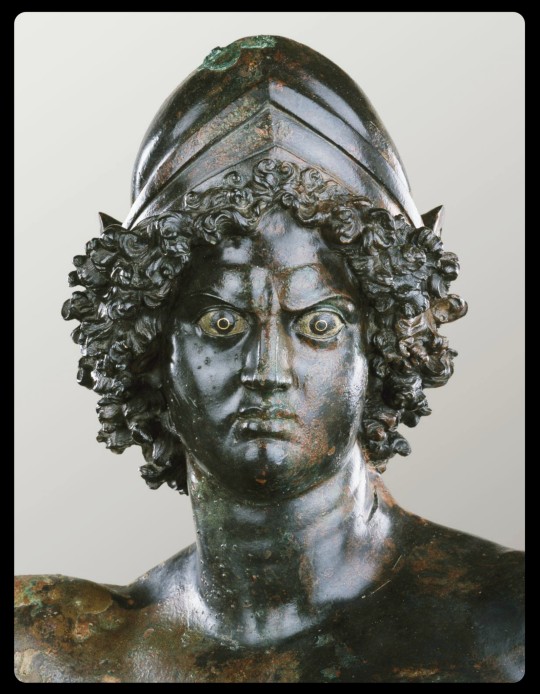
The bronze figure is nearly 1.5 meters (5 feet) tall. It has a strikingly intense expression, with eyes that are highlighted by gold and silver inlays.

According to this article:
A bronze statue of Mars, the Roman god of war, was found in the ancient city of Zeugma in the course of an excavation campaign in 1999-2000. The statue represents one of the most interesting and spectacular finds from this city on the banks of the Euphrates river in southern Anatolia.
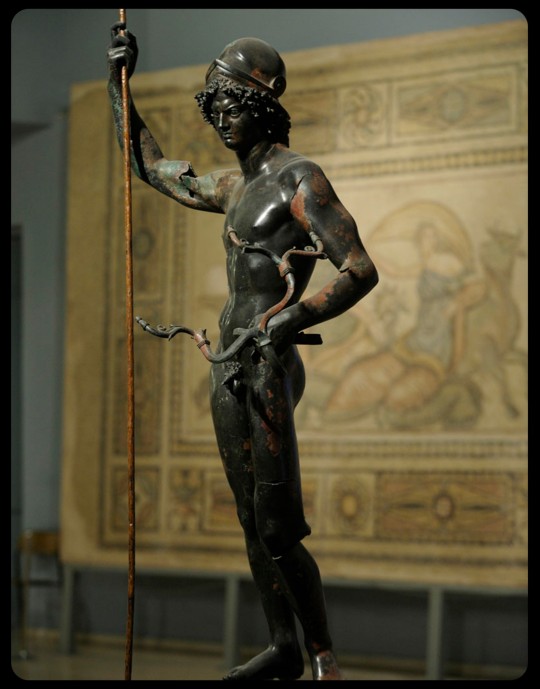
The statue is of great interest on one side for its rarity, as few Roman bronzes of such size are so well preserved, and on the other for its unusual iconography, depicting the standing God as a young athlete. The figure stands with the weight centered on the right leg, while the left, slightly bent, rests only on the flexed toes. The right arm is raised, its hand closed around a spear that has not been found, while the left is bent at the elbow, to almost 90° and with the hand wielding an object that appears to be a scourge with multiple and symmetrical endings.
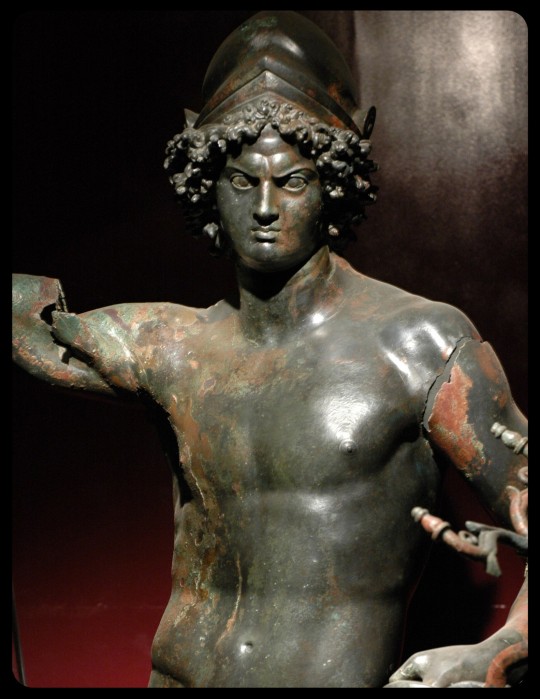
Beneath the helmet, thick curls frame the face of the young man whose frown is marked by strongly furrowed eyebrows and a very intense gaze, highlighted by silver and gold inlays around the pupils.
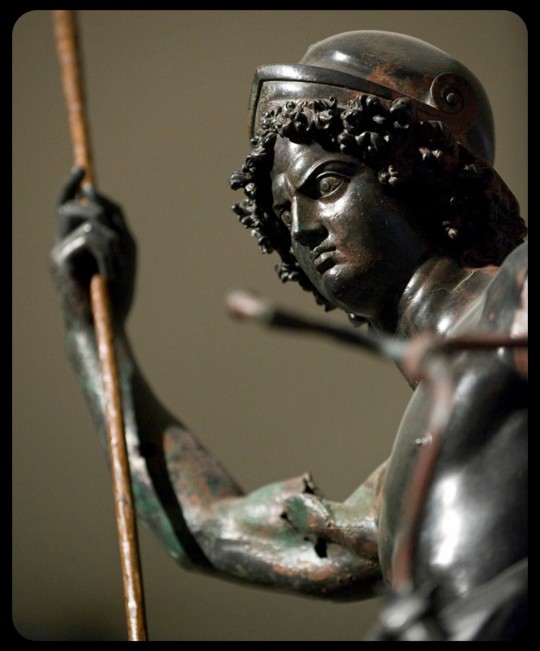
A chandelier was found along with the bronze. It is composed of a drum, similar in length to the sculpture, which passes through a disc and is inserted in a base. The small size of the space in which the artifacts were discovered and its place in the general plan of the villa suggests a closet where the precious materials were hidden to escape the pillaging of the city, carried out in 253-6 AD by the Sassanids.
Sources & More Info:
CCA (Centro di Conservazione Archeologica): Zeugma Mars Conservation Project
Journal of Roman Archaeology: The Bronze Mars of Zeugma
Turkish Museums: Time Capsule of Ancient Roman Art: Zeugma
Packard Humanities Institute: The Rescue Excavations at Zeugma in 2000 (PDF)
UNESCO: The Archaeological Site of Zeugma
Archaeological Institute of America: Troubled Waters
Archaeology Magazine: Zeugma After the Flood
#archaeology#artifact#history#anthropology#zeugma#turkey#anatolia#roman art#mars#god of war#ares#roman pantheon#paganism#ancient art#statue#bronze#classical antiquity#religion#art#sculpture#conservation
30 notes
·
View notes
Text
I'm going to tell you something that you may not like, you don't have to tell everyone things about yourself that can put you in danger. Especially now, if you are a part of any minority group, in a way that is not immediately apparent, you do not have to be open about that to everyone. Not everyone has to know you are trans, gay, Jewish, poc (obviously for white passing ppl), etc. You can lie or neglect to mention it for your safety. You don't have to be ashamed, but you don't have to put a target on your back. I have lived in conservative cities/towns almost my entire life, when I pass, I don't necessarily tell people that I'm trans. This can mean the difference between a (conditionally) civil interaction and a hate crime. Unless they have given you reason to believe they are safe, you do not owe anyone any information about yourself. The same goes for your political beliefs. I promise you, your hardcore Trump supporter coworker is not going to listen to your logical reasons as to why he is a fascist, and in fact, bad for all of us, it will only cause you problems.
#obviously not everyone's minority status isnt obvious#but even then#anything that may put you in more danger keep it to yourself in mixed company#and im not saying dont try to sway people who have conservative beliefs but arent completely lobotomized yet#just pick your battles
30 notes
·
View notes
Text
youtube
Yet another. Things Fascists Say!: On this episode, echoing verbatim, one of history’s most notorious fascists, Adolf Hitler himself. “They’re not human”, “It’s their genes”, “they’re poisoning the blood of our country“. If you want to live in a country, similar to the third Reich, full of racism and hate, a kleptocracy where the rich get richer and the middle class gets trampled, then trumps your guy.
We’ll see you next time on; Things Fascists Say!!
#Youtube#election 2024#traitor trump#kamala harris#politics#vote blue#donald trump#republicans#the left#news#gop#trump is a threat to democracy#kamala for president#fuck trump#declaration of independence#jd vance#democracy#harris waltz#harris walz 2024#trump for president#trump 2024#trump24#trump is a traitor#president trump#truth#constitution#conservatives#the statue of liberty#liberals#liberty
20 notes
·
View notes
Text

A rare view of the Statue of Liberty from the balcony on its torch. This point of view has been closed since 1916.
* * * *
LETTERS FROM AN AMERICAN
November 30, 2024
Heather Cox Richardson
Dec 01, 2024
Cas Mudde, a political scientist who specializes in extremism and democracy, observed yesterday on Bluesky that “the fight against the far right is secondary to the fight to strengthen liberal democracy.” That’s a smart observation.
During World War II, when the United States led the defense of democracy against fascism, and after it, when the U.S. stood against communism, members of both major political parties celebrated American liberal democracy. Democratic presidents Franklin Delano Roosevelt and Harry Truman and Republican president Dwight D. Eisenhower made it a point to emphasize the importance of the rule of law and people’s right to choose their government, as well as how much more effectively democracies managed their economies and how much fairer those economies were than those in which authoritarians and their cronies pocketed most of a country’s wealth.
Those mid-twentieth-century presidents helped to construct a “liberal consensus” in which Americans rallied behind a democratic government that regulated business, provided a basic social safety net, promoted infrastructure, and protected civil rights. That government was so widely popular that political scientists in the 1960s posited that politicians should stop trying to court voters by defending its broadly accepted principles. Instead, they should put together coalitions of interest groups that could win elections.
As traditional Republicans and Democrats moved away from a defense of democracy, the power to define the U.S. government fell to a small faction of “Movement Conservatives” who were determined to undermine the liberal consensus. Big-business Republicans who hated regulations and taxes joined with racist former Democrats and patriarchal white evangelicals who wanted to reinforce traditional race and gender hierarchies to insist that the government had grown far too big and was crushing individual Americans.
In their telling, a government that prevented businessmen from abusing their workers, made sure widows and orphans didn’t have to eat from garbage cans, built the interstate highways, and enforced equal rights was destroying the individualism that made America great, and they argued that such a government was a small step from communism. They looked at government protection of equal rights for racial, ethnic, gender, and religious minorities, as well as women, and argued that those protections both cost tax dollars to pay for the bureaucrats who enforced equal rights and undermined a man’s ability to act as he wished in his place of business, in society, and in his home. The government of the liberal consensus was, they claimed, a redistribution of wealth from hardworking taxpayers—usually white and male—to undeserving marginalized Americans.
When voters elected Ronald Reagan in 1980, the Movement Conservatives’ image of the American government became more and more prevalent, although Americans never stopped liking the reality of the post–World War II government that served the needs of ordinary Americans. That image fed forty years of cuts to the post–World War II government, including sweeping cuts to regulations and to taxes on the wealthy and on corporations, always with the argument that a large government was destroying American individualism.
It was this image of government as a behemoth undermining individual Americans that Donald Trump rode to the presidency in 2016 with his promises to “drain the swamp” of Washington, D.C., and it is this image that is leading Trump voters to cheer on billionaires Elon Musk and Vivek Ramaswamy as they vow to cut services on which Americans depend in order to cut regulations and taxes once again for the very wealthy and corporations.
But that image of the American government is not the one on which the nation was founded.
Liberal democracy was the product of a moment in the 1600s in which European thinkers rethought old ideas about human society to emphasize the importance of the individual and his (it was almost always a “him” in those days) rights. Men like John Locke rejected the idea that God had appointed kings and noblemen to rule over subjects by virtue of their family lineage, and began to explore the idea that since government was a social compact to enable men to live together in peace, it should rest not on birth or wealth or religion, all of which were arbitrary, but on natural laws that men could figure out through their own experiences.
The Founders of what would become the United States rested their philosophy on an idea that came from Locke’s observations: that individuals had the right to freedom, or “liberty,” including the right to consent to the government under which they lived. “We hold these truths to be self-evident,” Thomas Jefferson wrote, “that all men are created equal, that they are endowed by their Creator with certain unalienable Rights, that among these are Life, Liberty and the pursuit of Happiness,” and that “to secure these rights, governments are instituted among men, deriving their just powers from the consent of the governed.”
In the early years of the American nation, defending the rights of individuals meant keeping the government small so that it could not crush a man through taxation or involuntary service to the government or arbitrary restrictions. The Bill of Rights—the first ten amendments to the Constitution—explicitly prohibited the government from engaging in actions that would hamper individual freedom.
But in the middle of the nineteenth century, Republican president Abraham Lincoln began the process of adjusting American liberalism to the conditions of the modern world. While the Founders had focused on protecting individual rights from an overreaching government, Lincoln realized that maintaining the rights of individuals required government action.
To protect individual opportunity, Lincoln argued, the government must work to guarantee that all men—not just rich white men—were equal before the law and had equal access to resources, including education. To keep the rich from taking over the nation, he said, the government must keep the economic playing field between rich and poor level, dramatically expand opportunity, and develop the economy.
Under Lincoln, Republicans reenvisioned liberalism. They reworked the Founders’ initial stand against a strong government, memorialized by the Framers in the Bill of Rights, into an active government designed to protect individuals by guaranteeing equal access to resources and equality before the law for white men and Black men alike. They enlisted the power of the federal government to turn the ideas of the Declaration of Independence into reality.
Under Republican president Theodore Roosevelt, progressives at the turn of the twentieth century would continue this reworking of American liberalism to address the extraordinary concentrations of wealth and power made possible by industrialization. In that era, corrupt industrialists increased their profits by abusing their workers, adulterating milk with formaldehyde and painting candies with lead paint, dumping toxic waste into neighborhoods, and paying legislators to let them do whatever they wished.
Those concerned about the survival of liberal democracy worried that individuals were not actually free when their lives were controlled by the corporations that poisoned their food and water while making it impossible for individuals to get an education or make enough money ever to become independent.
To restore the rights of individuals, progressives of both parties reversed the idea that liberalism required a small government. They insisted that individuals needed a big government to protect them from the excesses and powerful industrialists of the modern world. Under the new governmental system that Theodore Roosevelt pioneered, the government cleaned up the sewage systems and tenements in cities, protected public lands, invested in public health and education, raised taxes, and called for universal health insurance, all to protect the ability of individuals to live freely without being crushed by outside influences.
Reformers sought, as Roosevelt said, to return to “an economic system under which each man shall be guaranteed the opportunity to show the best that there is in him.”
It is that system of government’s protection of the individual in the face of the stresses of the modern world that Franklin Delano Roosevelt, Harry Truman, Dwight Eisenhower, and the presidents who followed them until 1981 embraced. The post–World War II liberal consensus was the American recognition that protecting the rights of individuals in the modern era required not a weak government but a strong one.
When Movement Conservatives convinced followers to redefine “liberal” as an epithet rather than a reflection of the nation’s quest to defend the rights of individuals—which was quite deliberate—they undermined the central principle of the United States of America. In its place, they resurrected the ideology of the world the American Founders rejected, a world in which an impoverished majority suffers under the rule of a powerful few.
LETTERS FROM AN AMERICAN
HEATHER COX RICHARDSON
#Statue of Liberty#Movement conservatives#liberal consensus#FDR#Harry Truman#Dwight Eisenhower#post-World War II#American History#Letters fRom an American#Heather Cox richadrdson#history
16 notes
·
View notes
Text

Saiga antelope (Saiga tatarica)
#id in alt#sorry no spiel today but these guys are fascinating. highly rec reading about their history + current status and conservation efforts#endangered species#wildlife#animal art#animals#nature#anyway for junicorn i'm not drawing unicorns but i'm drawing antlered/horned animals in magical girl poses....this makes sense yes#ungulate june
199 notes
·
View notes
Text


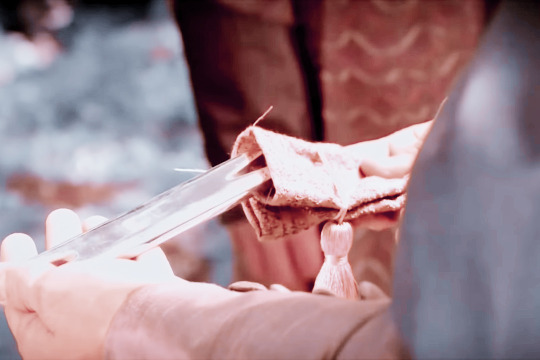

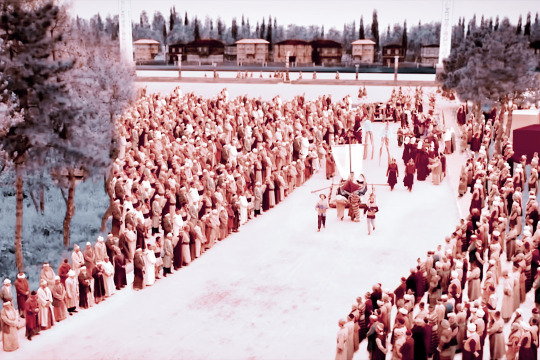


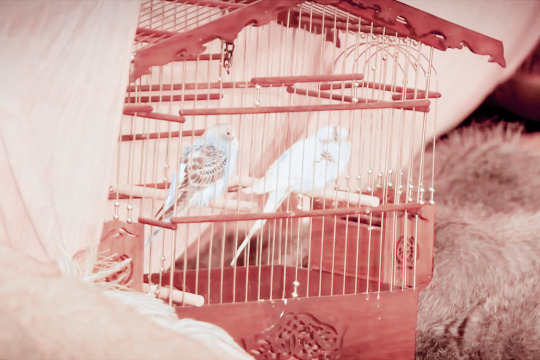
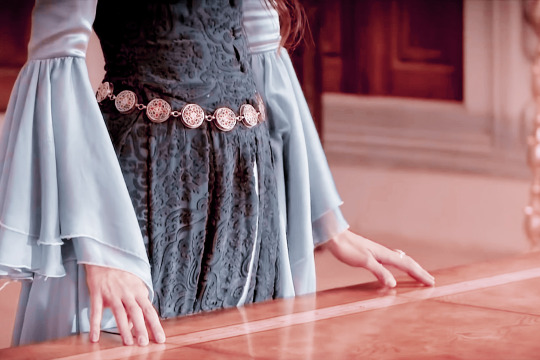

Magnificent Century Rewatch: One Picspam per Episode
Episode 17: The Double Joy
-My dear mother used to say "walk barefoot on earth and it shall take away all your troubles and sorrows, earth shall give you happiness and joy"
-Your mother spoke well, one can only find peace in earth. But I'm not sure if it is on earth or in it.
#the quote is a little bit silly but it adquires seriousness when you know everything that comes later#especially because it's hurrem's mother's quote from when she lived in ruthenia. when peace was possible. when she was going to marry leo#and had her future all planned. and there was stability#but the joke is suleyman's. after all becoming part of his family is what brings that ambiguity to the quote for hurrem's story#as it could be argued she never found true peace. at least for the most of her life#but also suleyman speaks in general terms here. so the quote can be extended to all the characters and in this episode of double joy it's#even more significant. because peace it's going to go sooner than later. and the signals of future ibratice problems are already there#and just as the birds are partly symbolic of that temporal peace and joy in love for hurrem the gifts the marriage gets are very important#as well#this episode is just gifts gifts gifts all around#suleyman's necklace for hatice has the tulips of the dynasty and it's something ibrahim himself recognizes could never give her#she says she's always going to have it w her. tho i don't remember seeing it too much in her tbh sdfy#in the other side ibrahim gets a lot of gifts. but the one that reminds him of his origin is his father's ofc. and he says he will always#have it with him as well. and later he gets suleyman's ring [i'm w haticehurrem. this totally looks like a subrahim wedding asfg]#which goes to remind us that he's now officially part of his family as well. he returned but he converted again. and THEN there's the table!#and taking away the politic alliance it could signify. it is venetian. his mother's heritage is there. in all the palace. and in the same#episode hurrem mentioned her mother's saying. the dynasty [or at least the most conservative side represented by ayse] it's unconfortable#the converts are not only winning more power and getting closer to the family. but they're also bringing their cultures & traditions to the#*ba dum tss* table#there's more to the whole return/convert and how it shows in the ibratice palace especially later w the statues but if i ever write about it#it deserves a post of its own ofc [and prolly someone that knows what they're talking about more than me lmao]#noo why did i write so much 😭 i should've done a separate post this is a mess to be under an already long picspam#anyways there's other significant gifts as the clock that musti likes or mahi's lucky charm for selim. and also the ones we already knew:#the ibratice gifts together 💝. and these contrast a lot with the rest because it's something of their own. when the couple was separated#from dynastic or even ibro's family. will they ever find peace again? we'll see it in the next episode [i'm lying]#maybe i should organize this in a post of its own#magnificent century#muhtesem yuzyil#mc1picspam4episode
13 notes
·
View notes
Text


Luna and Madju enjoying the nice weather on a cool October afternoon!
#not roller coasters#Luna the orangutan#Madju the orangutan#orangutan#orangutans#Bornean orangutan#primates#apes#2024#October 2024#zoo#zoo animals#wild animals#animals#animal#zoology#busch gardens animals#animal ambassador#animal conservation#conservation#Conservation status#Conservation status: critically endangered#vulnerable species#vulnerable#threatened species#threatened#endangered species#endangered#critically endangered#critically endangered species
6 notes
·
View notes
Text
Incredibly frustrating how often people take criticisms of society and especially established institutions of power as like. A personal attack.
#text post#shark thoughts#conservatives try to pull that shit all the time claiming black people and other poc are doing anti-white racism#and I keep seeing it when people talk about how misandry isn't real#it's irrelevant whether an individual can be a bigot against a majority group. these groups have power and use it to enforce the status quo#other forms of bigotry intersect with these privileges sure. but that doesn't mean they're not there.
23 notes
·
View notes
Text
hope everyone’s ready for 4 more years of infograph posting on ig
#*christopher walken voice* they’re all a bunch of phonies#i can’t even check my stories bc everyone’s sharing the same infographic about ICE & how you should respond to cops asking u some1’s status#my best friends sister got deported under obama & they were whipping haitians at the border under biden#but now that a conservative is behind it we can finally pretend we’re above that as a country#also u should already know not to talk to cops like why is THAT the pertinent info everyone’s sharing
8 notes
·
View notes
Text
IUCN redlist
CITES species checklist
#poll#otherkin#otherkind#therian#therianthropy#fictionkin#alterhuman#nonhuman#i believe its important to at the very least know if not be involved in or donate to conservation efforts and#environmental organisations. i'm aware the conservation status of animals isn't necessarily 100%#indicative of their realistic status and that it at times is a political decision to have them delisted or etc. but as a start#😊
21 notes
·
View notes